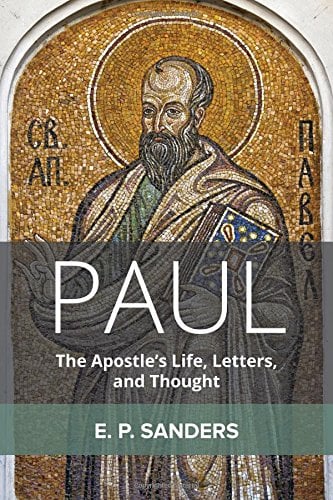p. 518– he goes with the translation ‘after receiving the Spirit by faithing what you heard… have you started with the Spirit but finished with the flesh (3.3). This may refer literally to the foreskin and hence to circumcision but in Gal. 5.17-18 flesh is the natural opposite of Spirit and flesh is connected to the Law. Sanders thinks flesh=works of the Law.
p. 519— In bringing up Abraham and arguing against circumcision Paul avoids Gen. 17.9-27 and instead focuses on Gen. 12.1-3; 15.6, 18.18 (here as elsewhere a large majority of Paul’s Bible quotes are conflations of two or more verses). On the surface Paul would seem to be wrong. God commanded Abraham to get circumcised, he and his family and descendants. Martyn argues and Sanders agrees that the opponents must have used the Abraham story to insist on circumcision of Gentiles. 3.6-9 is where the English translations do the worst job, obscuring Paul’s meaning.
p. 520—So Sanders translates ‘as Abraham faithed God and it was reckoned to him as righteousness [Gen. 15.6] so you see those who faith are the sons of Abraham. And the Scripture foreseeing that God would righteous the Gentiles by faith, declared the Gospel beforehand to Abraham saying ‘All Gentiles shall be blessed in you’ (combining Gen. 12.3 and 18.8). For this reason, those who faith are blessed with Abraham who faithed.’
The reason for this translation is that Paul is paralleling the key words in the proof text to his own statement of the case in vs. 8— they need to be the same in both cases to make the point.
p. 521— “In his own formulation of what Genesis says, he changed the verb faith to the noun faith and the noun righteous to the verb righteouses. As he wrote it, the verb faithed leads to the noun faith, and the verb righteoused followed the noun righteousness.” [Why not use ‘trust’ as the translation— Abraham trusted God, so that you see those who trust are the sons of God etc.] Gen. 18.18 is brought in because here Gentiles are mentioned as being blessed in Abraham. Paul disproves the argument of the opponents by using other parts of the Abraham story to make his point.
p. 522— Many take ‘reckoned’ to mean God does not actually make people who have faith righteous. They remain sinners but are declared righteous forensically, i.e. in a legal sense. But this is not what Paul means. Gal. 3.8 is the parallel where he says directly God righteouses Gentiles and the word reckoned is not reused. Paul is working from memory not combing the scrolls. In Rom. 4.9-12 he will add, but not in Galatians, oh yes, Abraham was circumcised.
p. 523— Gal. 3.10– having found the verse that connects blessing and Gentiles with Abraham in 18.18, he now finds the opposite which connects curse with the Law, and Sanders says is the only such verse that connections Law and curse in the same sentence— Deut. 27.26. ‘Cursed is everyone who does not uphold/confirm the words of this Law in order to do them.’ [This is rather ironic since Paul is encouraging his converts to do precisely that, only keep some of the earlier commandments]. There are other verses that connect curse with commandments but not with the term Law nomos in the LXX. The emphasis in that verse is not on perfect obedience to the whole Law or perfect fulfillment of every law, but on intention. The above is the Hebrew text, but Paul’s translation of the Greek text runs ‘Cursed be everyone who does not uphold all of the things written in the Book of the Law with the intention of doing them.’














